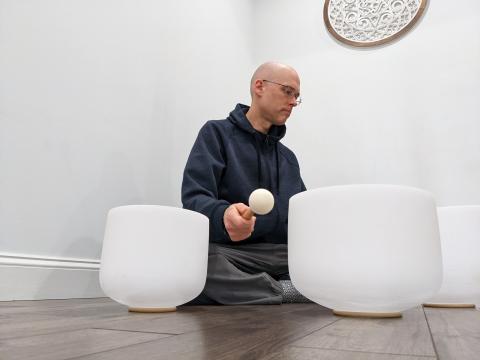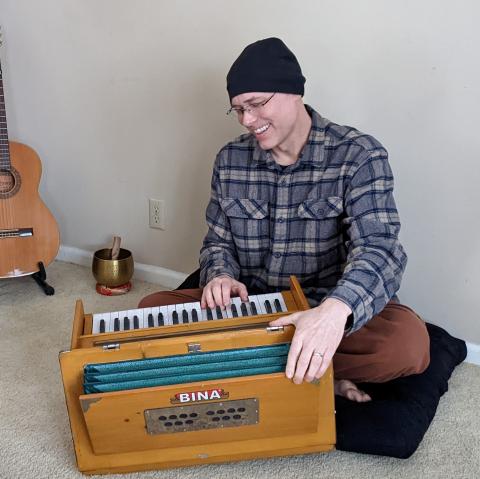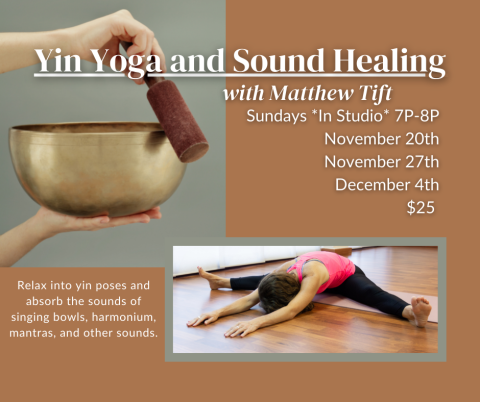About a year ago I started incorporating harmonium and chanting in my yoga classes. Those have become regular features at the beginning and end of my classes. Now I’m offering yoga classes with (live) sounds throughout.
This evening and next Sunday I will be leading “Yin Yoga and Sound Healing” classes at Spirit of the Lake. Yin is a popular, slow-paced style of yoga in which postures are held for 5 minutes or more. The combination of yin yoga and sound healing is far less common. So I would like to describe why I’m leading a class that combines these two practices.
What Is “Sound Healing”?
Sound healing is not a clearly-defined practice. Unlike “music therapy” and “audio therapy,” “sound healing” does not have a Wikipedia entry. A wide variety of sound/music practices could be considered “sound healing,” such as:
- Mantra therapy
- Nada yoga
- Bhakti yoga
- Sanskrit chanting
- Kirtan
To that list, I would add not-explicitly-yogic practices, like:
- The “Deep Listening” practices developed by Pauline Oliveros
- Minimalism
- Gregorian chant
- Listening to the wind chimes outside my window
In fact, all sounds could be “healing” for some people. The sound of a lawn mower might annoy one person and relax another. What counts as “sound healing” is debatable.
On the other hand, we can’t deny the fact that some people identify as “sound healers.” Those individuals might be members of organizations like:
- Sound Healers Association
- World Sound Healing Organization
- International Sound Therapy Association
- International Practitioners of Holistic Medicine
Sound healers might train at places such as the Sound Healing Academy. They might hold a certificate in sound healing from a public research university.
Sound healing often compliments other spiritual and healing practices, including:
- Reiki
- Cacao ceremonies
- Astrology
- Iowaska
- Breathwork
- Meditation
- Ayurveda
- Yoga
I offer this information to contextualize the practice of sound healing and acknowledge the breadth of the practices associated with sound healing. Yet, this is by no means comprehensive.
Sound Investigations
I have spent much of my life investigating sounds, especially musical ones. I have explored the intersections between music, sound, disease, and healing. Here are a few examples that came to mind:
- 1998: I performed Steve Reich’s “Violin Phase” on my violin and computer to investigate it’s hypnotic and calming effects.
- 2002: As a graduate student involved in AIDS activism, I wrote a 31-page paper exploring the influence of syphilis in Schubert’s music.
- 2007: I published my Ph.D. dissertation on the topic of musical responses to HIV/AIDS.
- 2019: I gave a conference talk titled “Meditative Live Coding and Musicological Hindrances” at the International Conference on Live Coding (Madrid, Spain).
In some ways, “Yin Yoga and Sound Healing” extends these explorations. It also diverges in meaningful ways. For me, sound healing must support the goals of yoga and meditation practice. I want to offer practices that help to still the fluctuations of the mind, realize the true self, and find liberation from suffering.
My views expanded as a result of some recent experiences at Kripalu. A couple of weeks ago, on a 10-day retreat with about 20 other yoga teachers, I felt inspired during a yoga nidra class lead by Jennifer Reis. Yoga nidra (“yogic sleep”), like sound healing, encompasses a wide variety of practices. Jennifer is a Kripalu yoga teacher and the creator of Divine Sleep Yoga Nidra. She said that there are “no yoga nidra police” and that there is no way to practice yoga nidra incorrectly. However, she prefers to offer yoga nidra experiences grounded in yogic wisdom. Her ideas felt both self-evident and revelational.
I realized how often I had looked for beneficial sounds outside the practice of yoga. My music meditation workshops and classes incorporated contemporary practices. The practice of “Deep Listening” developed by Pauline Oliveros had captured my attention. I practiced live coding for its meditative effect. These experiences were guided by yogic wisdom, but not explicitly.
Sound Healing Rooted in Yogic Wisdom
My upcoming “Yin Yoga and Sound Healing” classes are grounded in yogic wisdom. They are similar to my yoga asana classes. I connect the sounds and movement to foundational yogic principles. These are about more than just soaking in good vibrations. I find these sound practices useful. Mantra and chanting deepen my practice. I do not add these sounds to my yoga practice just to create something new and different.
This approach doesn’t require that I talk a lot during class. My class last Sunday incorporated Sanskrit bija mantra (“seed sounds”) from the Vedic period. We used these to explore the five levels of being called the koshas. Direct, experiential knowledge formed the foundation of the practice. Participants controlled their own experience. People participated in the way that felt most conducive to self-observation without judgement.
Of course, contemporary music and sounds still influence how I practice. Composers such as John Cage, Pauline Oliveros, Terry Riley, Philip Glass, and Karlheinz Stockhausen haven’t faded from my memory. Contemporary poets, such as Danna Faulds and Mark Nepo still influence my thinking. Nepo’s moving description of listening is relevant to my classes, whether or not they are informed by yogic principles: “To listen is to lean in softly with the willingness to be changed by what we hear.”

I ♡ Harmonium
In my personal practice, I play a lot of harmonium and do a lot of chanting. My harmonium is also a regular fixture in my weekly yoga classes. We chant OM at the beginning and end of a class. I offer chanting during savasana. The yin yoga and sound healing classes are like these other classes, except the movements are slower, and there are live sounds throughout most of the class.
People have told me about their positive experiences. One person told me, “the sound of the harmonium reminded me of my grandma.” Another said, “during savasana I felt like I was floating outside of my body, like in the closing scene of a movie.” Last weekend someone mentioned, “I couldn’t relax for most of the class, but during savasana I was finally able to find some peace.”
These experiences hearing a harmonium are not without precedent. In the 19th century, European doctors regularly used the harmonium (specifically) to help treat nervous disorders. More recent scientific research shows that mantras, in general, have healing effects, whether you understand or believe the words or not.

What to Expect
So if you come, do not expect to hear me live coding or performing minimalist music. You will hear singing bowls, harmonium, and chants connected to our yogic tradition. The chants come from sources such as the Vedas, the Upanishads, the Puranas, and Patanjali’s Yoga Sutras. We won’t listen to singing bowls just to relax. We will use them to explore yogic concepts like the five layers of awareness (koshas), five elements (pancha mahabhuta), and yoga’s ethical codes (yamas and niyamas).
Yoga nidra and restorative yoga can be quite relaxing, and people often fall asleep. But this sound healing class is not only for relaxation. In fact, yin yoga is not meant to be especially comfortable. It can take people outside of their comfort zone. The yin practice combined with sound can get us out of our analytical mind. During the class we can pay more attention to our actual lived experiences.
If you would like to join us, sign up here. If neither of these times work for you, I will be leading classes with the same name outside at the Minnesota Arboretum in 2023 on April 13, June 15, and August 17.

Comments2
I want to come!
Any dates coming up?
Upcoming yin yoga and sound healing classes
Hi Hiyala!
Yes, I will be offering Yin Yoga and Sound Healing at the Minnesota Arboretum on April 13, June 15, and August 17.
I have a similar class at Spirit of the Lake about once a month that I teach with Karen Murray called "Restorative Yoga with Reiki and Sound Healing." In those classes, I provide the sounds and Karen leads the restorative class and offers Reiki.
All of the details of these classes are on my schedule page.